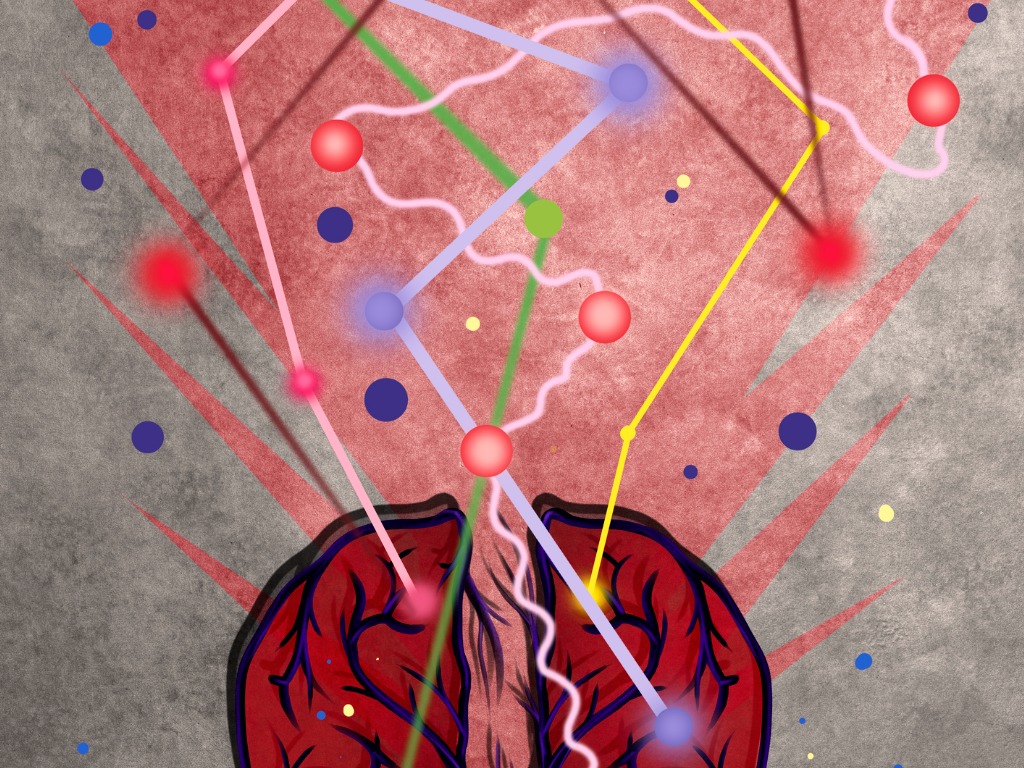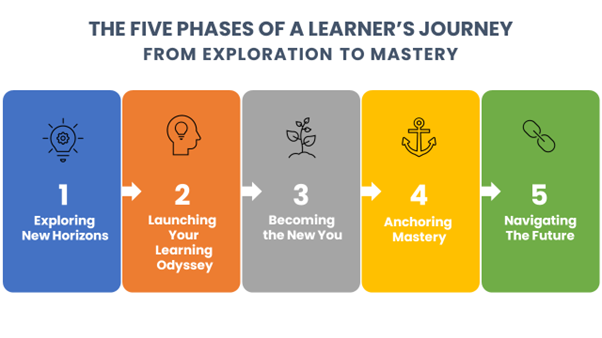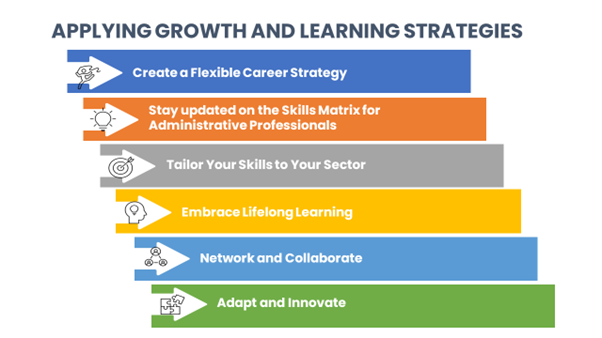
Navigate the ever-evolving landscape of work and position yourself for success, says Julia Schmidt
Growth and change can often feel frustrating and slow. In our career journey, we all experience good and bad moments – of success, stagnation, failures, losses, victories, and a fantastic drive to achieve our potential, learn, and grow.
Do you often find yourself stagnating or bored at work and in your personal life but still feel motivated to make the right changes and progress? Are you curious and encouraged to develop yourself but too hampered by existing obligations to believe you can succeed at something new? Have you already started something new but want to grow faster still? You should know and embrace this: Growth is our default setting!
When we talk about growth, we must consider challenges, disruption, and self-reinvention. To keep developing ourselves, we must constantly climb towards new knowledge and mastery of new skills.
Empowering Career Growth Through Adaptation and Upskilling
Building a strong base of skills and not just acquiring knowledge is what drives every economic field, encompassing design, manufacturing, services, and individual and social welfare. The McKinsey article “Taking a skills-based approach to building the future workforce” shows how a skills-based approach can help US employers expand talent pools and retain great workers by, for example, removing degree requirements from specific job postings and working with other organizations to help workers progress from lower- to higher-wage jobs. Also, creating skills-based job postings resulted in a substantial increase in applications from a broader set of workers.
So, what is essential for us to have in mind?
- Companies are launching initiatives to promote upskilling and reskilling to accelerate the learning of new and emergent skills. This also assists workers in finding better job opportunities and improving their skillset, improves employee retention, and creates a diverse workforce.
- Almost half of an individual’s skill and knowledge development comes from experiences at work. People accumulate experience and skills with each role they perform throughout their working life.
- We are surrounded by multi-talented people who carry a large set of skills. However, one great catalytic skill makes a difference in times of change and disruption – the skill to adapt and acquire new skills. “That adaptative skill becomes the reservoir from which new skills sprout and support new activities and even a new life,” says Bala Shankar, the author of The Twelve Habits of Smart Skill-Building.
- The ability to gain new skills around the existing ones, let go of skills that no longer serve us, and improve our adaptative and multidimensional skills is crucial in our journey to becoming the best version of ourselves and the best resources we can be for the organizations we are part of. Any role change or move up the career ladder requires more than skills development – it requires a growth mindset.
- The process of learning new skills starts with exploring new possibilities and ideas. Therefore, the more we understand the learning process and its stages, the better we can plan our learning journey – by allocating the right resources, identifying a support network, and becoming familiar with new tasks and challenges, in addition to keeping focus and fighting imposter syndrome and other negative feelings along the way.
The Learner’s Journey
There are five phases in the learner’s journey from exploration to mastery. We can use these phases to help us create a system to monitor and understand where we are and what we need to do to keep reinventing ourselves – making growth our default setting.

1. Exploring New Horizons: Searching for New Opportunities and Commitment
What do you first do when considering a new job or role change? We start by exploring new possibilities, ideas, and aspirations and collecting the necessary data. New opportunities can develop to become a new learning journey. It is also when things tend to go slow, and you may feel uncomfortable.
It’s time to ask as many questions as possible and identify patterns that will guide you along the way. This process involves much analysis, which demands a lot of your brain. It’s the time when too much new information can make us feel overwhelmed, discouraged, and in doubt.
Here are some key questions that can help you decide if the new terrain you are navigating permits further exploration:
- Is this challenge achievable?
- Can I accomplish it?
- Can I envision myself doing or being this?
- Does it align with my values and mission?
If the answer to these questions is a resounding “yes,” you are ready to advance. Now is the time to identify and assemble the resources necessary for your learning journey. Curiosity drives information collection, feedback-seeking, and the identification of mentors to expedite your learning curve. This phase also calls for a critical self-audit, shedding skills that no longer serve your growth, and embracing a growth mindset. As you identify areas for improvement, transform fear into challenges, and seize growth opportunities, you paint a vivid picture of the person you aspire to become.
Here is a set of questions designed to guide your evaluation of whether the information you are collecting aligns with your chosen learning path or if it indicates the need to consider an alternative direction:
- What evidence can I gather to validate that I am on the right learning path?
- Which fears can I transform into opportunities for personal growth?
- Who are the right people to help me progress?
- Do I need mentors, coaching, or other support?
- Am I fostering a growth mindset throughout my learning journey?
- Does the data I collect support staying on this path, or does it suggest I move on to another?
2. Launching Your Learning Odyssey: Embracing Challenges and Seeking Support
Having embarked on the right path, you launch your learning odyssey, immersing yourself in the challenge and boldly experimenting with fresh approaches, habits, and interactions. During this launch phase, the support of your manager is invaluable. Recognize that the early stages of learning a new skill can lead to a slower work pace compared to colleagues. However, with your manager’s support and the essential tools, resources, and training, you’ll chart a course toward success.
- Embrace the inevitability of a gradual learning curve.
- Seek your manager’s support and explain how your improved skillset will benefit you, your manager, and the organization.
- Cultivate belief in your ability to expand your skillset.
- Confront imposter syndrome and self-doubt. It is said that the only people who don’t have imposter syndrome are imposters!
- Ensure you have the necessary tools and resources: mentorship, learning platforms, individual development plan, and cross-training.
- Embrace feedback as a source of good information and a catalyst for growth.
- If you’re already an expert, invigorate your enthusiasm by challenging your existing expertise. There is always room for improvement!
3. Becoming the New You: Accelerating Growth with Confidence and Purpose
Growth becomes apparent, and speed increases again when you realize your potential, strengthen your confidence, and attain the right balance of familiar information, tasks, and new challenges. You are becoming the new you.
At this stage, motivation and confidence are your main drivers. There are fewer gaps in your knowledge, and you have a good perception of the remaining gaps and how to minimize them. You can now make the right choices and know what you need to start running faster. The efforts become less stressful as you attain more equilibrium. You achieve a feeling of managing yourself, becoming familiar with challenges, and knowing you will conquer them.
You improve competence, progress toward your goals efficiently, and produce desired results. You will also enhance autonomy, which speeds you up in taking responsibility, making decisions, and solving problems, as you understand you have the power to make a difference. Gradually, you will move from being something you do (for example, “I am training to become a project manager”) to slowly becoming something you are (for example, “I am a project manager”). It means you can feel and see the growth.
And to avoid disrupting the productive flow, you will need to keep focus and prioritize. Give attention to the right things to prevent slowing down growth energy.
- Recharge your energy reserves.
- Ward off distractions by maintaining focus.
- Harness creativity, innovation, and persistence to optimize your journey.
- Mobilize your support network, including internal and external allies.
- Cultivate an unrelenting appetite for learning while navigating your transformation.
4. Anchoring Mastery: Reflection, Celebration, and Embracing New Challenges
You will feel competent and productive when you start mastering your new skills. You become a significant team player, give advice, train, and mentor others. You will be reaching your objective, and your new skills are anchored and now part of you.
- It is time to pause and reflect on the experience. As the rush of growth is over and you await new challenges, take some time to find the patterns that will help you advance in your career and your subsequent new learning cycles.
- Celebrate your achievements, whether they are small or big. Behavioral scientist B. J. Fogg wrote, “Celebration is the best way to create a positive feeling that wires in new habits.”
- Get ready for the next learning opportunities by, for example, checking the opportunities you turned down to maintain focus. It is now time to say “yes” to some of them. You are still motivated by the stability and confidence the anchoring gives you.
- Remember that the end of one experience is the groundwork for the next one.
5. Navigating the Future: Embracing New Horizons in Your Career Journey
So now what?
When a meaningful journey ends, some of us tend to experience sadness. Questions like “What’s next?” or “Where do we go from here?” may surface. After the celebration winds down, it’s time to set your sights on new accomplishments and pave the way forward.
- Do not stop here; your career journey is filled with new learning adventures.
- Avoid stagnation; resilience will help you navigate personal and professional challenges.
- Engage in candid discussions with your managers about your career aspirations.
- Align your professional development with your company’s growth strategy.
- Hold information meetings with other executive support professionals or people outside the organization if you find you are moving in another direction and want to explore the possibilities.
- Take advantage of your energy and enthusiasm to start navigating new learning paths.
- Contemplate new questions: Do I want more challenges? Is there more to learn and become? What else could I do and improve?
So, your task now is to do a self-assessment to identify where you are in your current learning journey. Identify the kind of support you need from others, whether emotional or intellectual, and how to co-design and tailor your learning program with L&D professionals to improve your learning experience.
Applying Growth and Learning Strategies
Now that we’ve explored the journey of personal and professional growth, let’s delve into how we can apply these strategies effectively in our careers.
Create a flexible career strategy
Adaptability is key in today’s dynamic job market. Craft a flexible career strategy that can adapt to changing trends and demands. Embrace a mindset of continuous growth and be prepared to pivot when necessary.
Stay updated on the Global Skills Matrix for Administrative Professionals
It is an important tool to help you manage, plan, and monitor the existing and desired skills for your role and to empower you to thrive in this ever-changing landscape. Whether it’s digital literacy, communication, time management, or problem-solving, these skills form the bedrock of professional success.
Tailor your skills to your sector
Recognize that skill demands can vary significantly between different sectors and industries. Conduct thorough research to understand which skills are in high demand in your specific field. Tailor your learning journey to align with the unique requirements of your industry.
Embrace lifelong learning
Learning doesn’t end when formal education concludes. Embrace the concept of lifelong learning. Seek out opportunities for ongoing education, whether through courses, certifications, or simply staying curious about new developments in your field.
Network and collaborate
Building a strong and diverse professional network is invaluable. Connect with peers, mentors, and experts in and outside your industry. Collaboration and knowledge sharing can accelerate learning and open new opportunities.
Adapt and innovate
Be open to change and innovation. Embrace emerging technologies and trends that can enhance your skillset and make you a valuable contributor to your organization.
By applying these strategies, you’ll be better equipped to navigate the ever-evolving landscape of work and position yourself for success in your career.

In Conclusion
The trajectory of careers today encompasses diverse pathways, shaped primarily by individual choices and not solely by external influences or constraints. You are the chief architect of your career, responsible for expressing your interests and needs to all stakeholders. You have an important role to play in all that, as you are one of the millions of workers being affected by the rapid advances of technology and the need for reskilling and upskilling.
A career is inherently dynamic, a series of events and decisions dictating transitions from one job to another. Thus, every upskilling journey mirrors these dynamic developments and transformations.
The five phases of a learner’s journey – an expedition from exploration to mastery – offer you valuable insights into embracing challenges, seeking support, and ultimately navigating the future. It also provides a comprehensive guide to career growth and development, emphasizing the importance of continuous learning and adaptation.
You have the power to shape your career!













